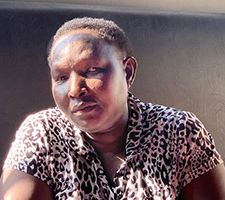
Each evening and every time it rains, Esther Ngina Njuguna gathers the few food items she sells at an open-air market on the outskirts of Nairobi, Kenya and gets them to safety. If she had a little shop with a roof and storage space, the widow and mother of two could sell more products and send her children to school.
Nearby, Teresia Aoko Bulimo, a tailor, is trying to form a team of workers with disabilities to sew uniforms for area schools. The hitch: traditional commercial space would add too much cost to the process.
Inspired by entrepreneurs worldwide who are repurposing old shipping containers into housing and pop-up shops, Daniel Chege is working on a plan to purchase and manage a few containers in Kiambu County that could house both of these fledgling businesses, and more, in a country where very few people with disabilities can find work.
It’s just one of several economic development initiatives Chege explored through a U.S. State Department-funded exchange program this month with his mentor, the Institute on Community Integration’s MacDonald Momo Metzger. Metzger is an education program specialist with deep experience supporting people with disabilities in person-centered careers and life planning.
This month, Metzger traveled to Kenya to support Chege’s work there and consult with local leaders on several economic development initiatives. The pair also met U.S. Ambassador to Kenya Kyle McCarter and other Embassy staff to discuss the projects.
In May, Chege spent a month in Minneapolis with Metzger and other ICI leaders, as well as representatives from area organizations, observing how they help people with disabilities create resumes and find jobs in the community.
“In Africa, the idea of people with disabilities earning their own wages is still very new,” said Metzger, who is originally from Liberia. “Most people think they can’t work, so we’re trying to create some awareness and change that assumption.”
Chege, Njuguna, and Bulimo are part of Murera Persons with Disability Welfare Association, a community organization aiming to assist its members to become self-reliant through economic opportunity.
Speaking to the group near the end of Metzger’s trip, Stephen Kahingo, Murera’s chairperson, said members of the organization learned a great deal from the exchange about bringing more inclusive employment to Kenya.
“We are so grateful for this golden opportunity to learn from you,” he said in thanking Metzger for the experience. “You came to share knowledge with us, and knowledge lives forever.”
Also during the two-week trip, Metzger and Chege met with the Vice Chancellor of DayStar University, Laban Ayiro, and others to establish a School of Education and Disability Studies. ICI will offer initial support for the proposed school and will collaborate on its development.
The Professional Fellows Program on Inclusive Disability Employment is sponsored by the U.S. Department of State Bureau of Educational and Cultural Affairs and implemented by the Association of University Centers on Disabilities, the Institute for Community Inclusion at UMass Boston and Humanity & Inclusion.



